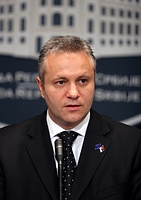- Serbia
Get to know Serbia
- Citizens
Culture and science
Health services
Pension and disability insurance
- Business
Employment
Economy
- Media
- Government
- Contact
Keep in touch
Contact form
Back
Keepin touch
Whether you have a question, comment, suggestion or any problem in the purview of the government, send us your message and we will try to respond as soon as possible. If your problem is not in our purview, we will forward your message to the relevant institution.
Q:
A:
Serbia to clear all debts to IMF in 2007
Belgrade,
20 October 2006
Serbian Minister of Finance Mladjan Dinkic said today that Serbia completed its three-year arrangement with the International Monetary Fund (IMF) in February this year and on the basis of that, was given an additional write-off of debts to the Paris Club of Creditors.
Dinkic said that in view of the strong rise in foreign currency reserves in the past five years, the government and the central bank have decided to return Serbia's entire debt to the IMF which is due in the next five years, in one sole year.
He explained that €500 million has already been repaid, while the remaining €500 million will be paid to this financial institution by May 1 next year, with which Serbia will clear its entire debt to the IMF.
According to Dinkic, Serbia no longer needs the kind of arrangements with the IMF it had in the first few years of transition when it was necessary to carry out difficult and painful reforms. The IMF's main role, which is insisting on measures that lead to long-term macroeconomic stability, has been completed in Serbia.
Speaking about the IMF's position on the effects of the National Investment Plan on public spending and inflation, Dinkic said that he managed to convince them that this plan of investment will not lead to an increase in prices, but added that the IMF's role is to always warn of caution.
They are not against the National Investment Plan, they are just afraid of its volume. They support that programme of investments, but they only warn that €1.6 billion could be too high an amount, Dinkic explained.
Speaking about the reasons which made this year better than the previous ones in terms of the economy, the Minister said that large foreign multinationals helped Serbia increase exports, and on the other hand, privatisation helped increase the economy's efficiency.
However, I believe that a higher employment rate is possible only with entirely new, greenfield investments and the development of small and medium-sized enterprises. Large companies have modern technology and employ many people, but I think that now it is imperative to stimulate small and medium-sized enterprises, Dinkic concluded.
He explained that €500 million has already been repaid, while the remaining €500 million will be paid to this financial institution by May 1 next year, with which Serbia will clear its entire debt to the IMF.
According to Dinkic, Serbia no longer needs the kind of arrangements with the IMF it had in the first few years of transition when it was necessary to carry out difficult and painful reforms. The IMF's main role, which is insisting on measures that lead to long-term macroeconomic stability, has been completed in Serbia.
Speaking about the IMF's position on the effects of the National Investment Plan on public spending and inflation, Dinkic said that he managed to convince them that this plan of investment will not lead to an increase in prices, but added that the IMF's role is to always warn of caution.
They are not against the National Investment Plan, they are just afraid of its volume. They support that programme of investments, but they only warn that €1.6 billion could be too high an amount, Dinkic explained.
Speaking about the reasons which made this year better than the previous ones in terms of the economy, the Minister said that large foreign multinationals helped Serbia increase exports, and on the other hand, privatisation helped increase the economy's efficiency.
However, I believe that a higher employment rate is possible only with entirely new, greenfield investments and the development of small and medium-sized enterprises. Large companies have modern technology and employ many people, but I think that now it is imperative to stimulate small and medium-sized enterprises, Dinkic concluded.
-
 Belgrade/Brussels, 19 November 2025
Belgrade/Brussels, 19 November 2025European integration shared responsibility of entire society
-
 Belgrade, 29 October 2024
Belgrade, 29 October 2024State moves to minimise advertising for betting shops
-
 Belgrade/Berlin, 28 January 2016
Belgrade/Berlin, 28 January 2016Fences cannot stop migrations
-
 Belgrade, 7 January 2016
Belgrade, 7 January 2016Serbia to experience dynamic economic growth in 2016
-
 Belgrade, 31 December 2015
Belgrade, 31 December 2015Serbia will persevere on path of development, reforms
-
 Belgrade, 30 December 2015
Belgrade, 30 December 2015Ground for Serbia’s progress set
-
 Belgrade, 28 December 2015
Belgrade, 28 December 2015Serbia ready for improvement of cooperation with Russia
-
 Belgrade, 22 December 2015
Belgrade, 22 December 2015Serbia ready to open six more chapters next year
-
 Belgrade, 21 December 2015
Belgrade, 21 December 2015Serbia to be part of EU by 2020
-
 Belgrade, 20 December 2015
Belgrade, 20 December 2015Serbia ready for EU membership by 2019

